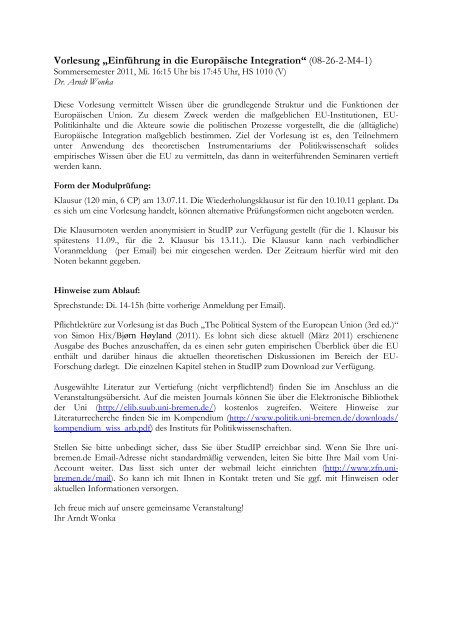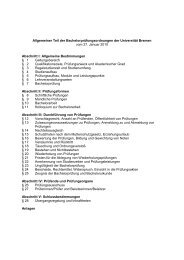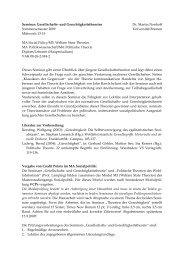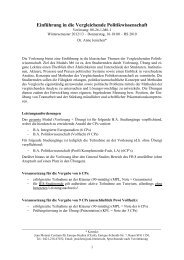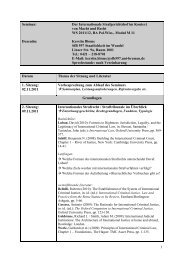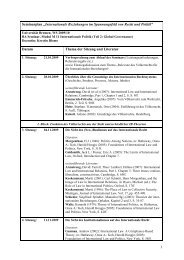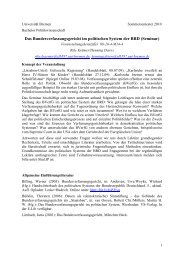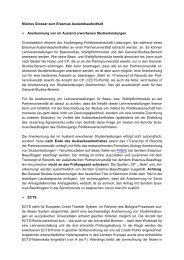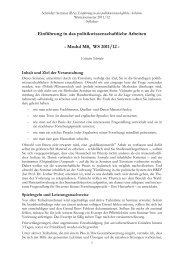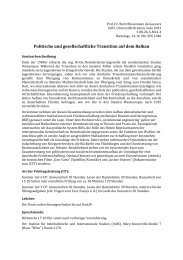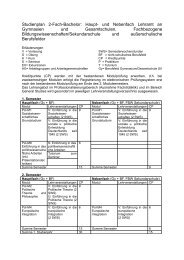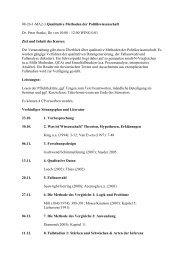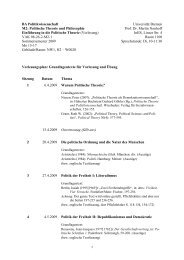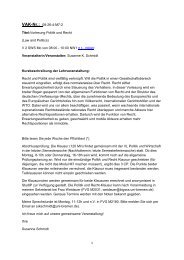Europäische Integration - Institut für Politikwissenschaft
Europäische Integration - Institut für Politikwissenschaft
Europäische Integration - Institut für Politikwissenschaft
You also want an ePaper? Increase the reach of your titles
YUMPU automatically turns print PDFs into web optimized ePapers that Google loves.
Vorlesung „Einführung in die <strong>Europäische</strong> <strong>Integration</strong>“ (08-26-2-M4-1)<br />
Sommersemester 2011, Mi. 16:15 Uhr bis 17:45 Uhr, HS 1010 (V)<br />
Dr. Arndt Wonka<br />
Diese Vorlesung vermittelt Wissen über die grundlegende Struktur und die Funktionen der<br />
<strong>Europäische</strong>n Union. Zu diesem Zweck werden die maßgeblichen EU-<strong>Institut</strong>ionen, EU-<br />
Politikinhalte und die Akteure sowie die politischen Prozesse vorgestellt, die die (alltägliche)<br />
<strong>Europäische</strong> <strong>Integration</strong> maßgeblich bestimmen. Ziel der Vorlesung ist es, den Teilnehmern<br />
unter Anwendung des theoretischen Instrumentariums der <strong>Politikwissenschaft</strong> solides<br />
empirisches Wissen über die EU zu vermitteln, das dann in weiterführenden Seminaren vertieft<br />
werden kann.<br />
Form der Modulprüfung:<br />
Klausur (120 min, 6 CP) am 13.07.11. Die Wiederholungsklausur ist <strong>für</strong> den 10.10.11 geplant. Da<br />
es sich um eine Vorlesung handelt, können alternative Prüfungsformen nicht angeboten werden.<br />
Die Klausurnoten werden anonymisiert in StudIP zur Verfügung gestellt (<strong>für</strong> die 1. Klausur bis<br />
spätestens 11.09., <strong>für</strong> die 2. Klausur bis 13.11.). Die Klausur kann nach verbindlicher<br />
Voranmeldung (per Email) bei mir eingesehen werden. Der Zeitraum hier<strong>für</strong> wird mit den<br />
Noten bekannt gegeben.<br />
Hinweise zum Ablauf:<br />
Sprechstunde: Di. 14-15h (bitte vorherige Anmeldung per Email).<br />
Pflichtlektüre zur Vorlesung ist das Buch „The Political System of the European Union (3rd ed.)“<br />
von Simon Hix/Bjørn Høyland (2011). Es lohnt sich diese aktuell (März 2011) erschienene<br />
Ausgabe des Buches anzuschaffen, da es einen sehr guten empirischen Überblick über die EU<br />
enthält und darüber hinaus die aktuellen theoretischen Diskussionen im Bereich der EU-<br />
Forschung darlegt. Die einzelnen Kapitel stehen in StudIP zum Download zur Verfügung.<br />
Ausgewählte Literatur zur Vertiefung (nicht verpflichtend!) finden Sie im Anschluss an die<br />
Veranstaltungsübersicht. Auf die meisten Journals können Sie über die Elektronische Bibliothek<br />
der Uni (http://elib.suub.uni-bremen.de/) kostenlos zugreifen. Weitere Hinweise zur<br />
Literaturrecherche finden Sie im Kompendium (http://www.politik.uni-bremen.de/downloads/<br />
kompendium_wiss_arb.pdf) des <strong>Institut</strong>s <strong>für</strong> <strong>Politikwissenschaft</strong>en.<br />
Stellen Sie bitte unbedingt sicher, dass Sie über StudIP erreichbar sind. Wenn Sie Ihre unibremen.de<br />
Email-Adresse nicht standardmäßig verwenden, leiten Sie bitte Ihre Mail vom Uni-<br />
Account weiter. Das lässt sich unter der webmail leicht einrichten (http://www.zfn.unibremen.de/mail).<br />
So kann ich mit Ihnen in Kontakt treten und Sie ggf. mit Hinweisen oder<br />
aktuellen Informationen versorgen.<br />
Ich freue mich auf unsere gemeinsame Veranstaltung!<br />
Ihr Arndt Wonka
Ablaufplan<br />
1 06.04. Einführung: Übersicht über das politische System der EU<br />
2 13.04. Warum schreitet <strong>Integration</strong> voran? <strong>Integration</strong>stheorien<br />
3 20.04.<br />
4 04.05. Ministerrat<br />
Hix/Høyland (2011), The Political System of the EU, Kap 1: 1-19<br />
<strong>Europäische</strong> Kommission<br />
Hix/Høyland (2011), The Political System of the EU, Kap 2: 23-48<br />
Hix/Høyland (2011), The Political System of the EU, Kap 3: 49-74<br />
5 11.05. <strong>Europäische</strong>s Parlament<br />
(ebenso Kap. 3)<br />
6 18.05. <strong>Europäische</strong>r Gerichtshof (EuGH)<br />
Hix/Høyland (2011), The Political System of the EU, Kap 4: 75-101<br />
7 25.05. Demokratie, Parteien, Wahlen<br />
Hix/Høyland (2011), The Political System of the EU, Kap 6: 130-158<br />
8 01.06. Interessengruppen und Interessenvermittlung<br />
Hix/Høyland (2011), The Political System of the EU, Kap 7: 159-186<br />
9 08.06. Binnenmarkt und regulative Politik<br />
Hix/Høyland (2011), The Political System of the EU, Kap 8: 189-217<br />
10 15.06. Distributive Politik und WWU<br />
11 22.06. Justiz und Inneres<br />
12 29.06. Außenpolitik<br />
Hix/Høyland (2011), The Political System of the EU, Kap 9 + 10: 218-<br />
244 + 245-272<br />
Hix/Høyland (2011), The Political System of the EU, Kap 11: 273-301<br />
Hix/Høyland (2011), The Political System of the EU, Kap 12: 302-330<br />
13 06.07. Zusammenfassung und Vorbesprechung Klausur<br />
14 13.07. Klausur
Vertiefende Literatur (nicht verpflichtend)<br />
1 06.04. Einführung<br />
2 13.04. Warum schreitet <strong>Integration</strong> voran? <strong>Integration</strong>stheorien<br />
3 20.04. Kommission<br />
Benz, Arthur (2008): The EU’s competences: The ‘vertical’ perspective<br />
on the multilevel system. In: Living Reviews in European<br />
Governance 3(3), abrufbar unter<br />
.<br />
Bieling, Hans-Jürgen/ Marika Lerch (2005): Theorien der <strong>Europäische</strong>n<br />
<strong>Integration</strong>: Ein Systematisierungsversuch. In: Bieling, Hans-Jürgen/<br />
Marika Lerch (Hrsg.), Theorien der <strong>Europäische</strong>n <strong>Integration</strong>.<br />
Wiesbaden: VS Verlag <strong>für</strong> Sozialwissenschaften, 9-39.<br />
Pollack, Mark A. (2005): Theorizing the European Union: International<br />
Organization, Domestic Polity, or Experiment in New Governance?<br />
In: Annual Review of Political Science 8, 357-398.<br />
Moravcsik, Andrew (1993): Preferences and Power in the European<br />
Community: A Liberal Intergovernmentalist Approach. In: Journal of<br />
Common Market Studies 31, 473-524.<br />
Knodt, Michèle/ Martin Große Hüttmann (2005): Der Multi-Level<br />
Governance-Ansatz. In: Bieling, Hans-Jürgen/ Marika Lerch (Hrsg.),<br />
Theorien der <strong>Europäische</strong>n <strong>Integration</strong>. Wiesbaden: VS Verlag <strong>für</strong><br />
Sozialwissenschaften, 223-247.<br />
Rittberger, Berthold/Frank Schimmelfennig (2005): <strong>Integration</strong>stheorien:<br />
Entstehung und Entwicklung der EU. In Holzinger,<br />
Katharina/Knill, Christoph/Peters, Dirk, Rittberger, Berthold,<br />
Schimmelfennig, Frank/Wolfgang Wagner (Hrsg.), Die <strong>Europäische</strong><br />
Union. Theorien und Analysekonzepte. Paderborn: Ferdinand<br />
Schöningh.<br />
Wagner, Wolfgang (2005): Der akteurzentrierte <strong>Institut</strong>ionalismus. In:<br />
Bieling, Hans-Jürgen/ Marika Lerch (Hrsg.), Theorien der<br />
<strong>Europäische</strong>n <strong>Integration</strong>. Wiesbaden: VS Verlag <strong>für</strong><br />
Sozialwissenschaften, 249-270.<br />
Egeberg, Morten (2006): Executive Politics as Usual: Role Behaviour and<br />
Conflict Dimensions in the College of European Commissioners. In:<br />
Journal of European Public Policy 17(1), 1-15.<br />
Ellinas, Antonis/ Ezra Suleiman (2008): Reforming the Commission:<br />
between modernization and bureaucratization. In: Journal of European<br />
Public Policy 15(5), 708 - 725.<br />
From, Johan (2002): Decision-making in a complex environment: a<br />
sociological institutionalist analysis of competition policy decisionmaking<br />
in the European Commission. In: Journal of European Public<br />
Policy 9(2), 219-237.
Kassim, Hussein/ Dionyssis G. Dimitrakopoulos (2007): The European<br />
Commission and the future of Europe. In: Journal of European Public<br />
Policy 14(8), 1249-1270.<br />
Laffan, Brigid (1997): From Policy Entrepreneur to Policy Manager: The<br />
Challenge Facing the European Commission. In: Journal of European<br />
Public Policy 4(3), 422-438.<br />
Majone, Giandomenico (2002): The European Commission: The Limits<br />
of Centralisation and the Perils of Parliamentarisation. In: Governance<br />
15(3), 375-392.<br />
Martens, Maria (2008): Administrative <strong>Integration</strong> through the Back<br />
Door? The Role and Influence of the European Commission in<br />
Transgovernmental Networks within the Environmental Policy<br />
Field. In: Journal of European <strong>Integration</strong> 30(5), 635-651.<br />
Nugent, Neill/ Sabine Saurugger (2002): Organizational structuring: the<br />
case of the European Commission and its external policy<br />
responsibilities. In: Journal of European Public Policy 9(3), 345-364.<br />
Peterson, John (2008): Enlargement, reform and the European<br />
Commission. Weathering a perfect storm? In: Journal of European<br />
Public Policy 15(5), 761 - 780.<br />
Schmidt, Susanne K. (2000): Only an Agenda Setter? The European<br />
Commission's Power over the Council of Ministers. In: European<br />
Union Politics 1(1): 37-61.<br />
Schmidt, Susanne K. (2001): Die Einflussmöglichkeiten der<br />
<strong>Europäische</strong>n Kommission auf die europäische Politik. In: Politische<br />
Vierteljahresschrift 42(2): 173-192.<br />
Schmidt, Susanne K. (2001): A Constrained Commission: Informal<br />
Practices of Agenda Setting in the Council. In: Aspinwall, Mark/<br />
Gerald Schneider (Hrsg.): The Rules of <strong>Integration</strong>. The<br />
<strong>Institut</strong>ionalist Approach to European Studies. Manchester:<br />
Manchester University Press, 2001, 125-146.<br />
Schmidt, Susanne K. (2004): The European Commission's Powers in<br />
Shaping European Policies. In: Dimitrakopoulos, Dionyssis G.<br />
(Hrsg.), The Changing European Commission. Manchester:<br />
Manchester University Press, 2004, 105-120.<br />
Smith, Mitchell P. (2000). The European Commission: Diminishing<br />
Returns to Entrepreneurship. In: Green Cowles, Maria/ Michael<br />
Smith (Hrsg.), The State of the European Union. Oxford: Oxford<br />
University Press, 207-227.<br />
Trondal, Jarle (2007): Contending Decision-Making Dynamics within the<br />
European Commission. In: Comparative European Politics 5, 158-178.<br />
Trondal, Jarle (2007): Is the European Commission a 'Hothouse' for<br />
Supranationalism? Exploring Actor-Level Supranationalism. In:<br />
Journal of Common Market Studies 45(5), 1111-1133.<br />
Wonka, Arndt (2007): Technocratic and independent? The appointment<br />
of European Commissioners and its policy implications. In: Journal of<br />
European Public Policy 14(2), 171-191.
4 04.05. Ministerrat<br />
5 11.05. Parlament<br />
Wonka, Arndt (2008): Decision-making dynamics in the European<br />
Commission: partisan, national or sectoral? In: Journal of European<br />
Public Policy 15(8), 1145-1163.<br />
Wonka, Arndt (2008): Die <strong>Europäische</strong> Kommission: Supranationale<br />
Bürokratie oder Agent der Mitgliedstaaten? Baden-Baden: Nomos.<br />
Fouilleux, Eve/ Jaques de Maillard/ Andy Smith (2005): Technical or<br />
political? The working groups of the EU Council of Ministers. In:<br />
Journal of European Public Policy 12, 609-623.<br />
Häge, Frank M. (2007): Committee Decision-making in the Council of<br />
the European Union. In: European Union Politics 8(3), 299-328<br />
Häge, Frank M. (2008): Who Decides in the Council of the European<br />
Union? In: Journal of Common Market Studies 46(3), 533-558.<br />
Hayes-Renshaw, Fiona/ Helen Wallace (1995): Executive Power in the<br />
European Union: the Functions and Limits of the Council of<br />
Ministers. Journal of European Public Policy 2(4), 559-582.<br />
Hayes-Renshaw/ Fiona/ Wim van Aken/ Helen Wallace (2006): When<br />
and Why the EU Council of Ministers Votes Explicitly. In: Journal of<br />
Common Market Studies 44(1), 161-194.<br />
Heisenberg, Dorothee (2007): Informal Decision-Making in the Council:<br />
The Secret of the EU's Success? In: Meunier, Sophie/ Kathleen R.<br />
McNamara (Hrsg.), Making History. European <strong>Integration</strong> and<br />
<strong>Institut</strong>ional Change at Fifty. Oxford: Oxford University Press, 67-<br />
87.<br />
Lewis, Jeffrey (2000): The methods of community in EU decision-making<br />
and administrative rivalry in the Council's infrastructure. In: Journal of<br />
European Public Policy 7(2), 261-289.<br />
Lewis, Jeffrey (2003). <strong>Institut</strong>ional Environments and Everyday EU<br />
Decision-making. Rationalist or Constructivist? In: Comparative<br />
Political Studies 36(1/2), 97-124.<br />
Mattila, Mikko (2004): Contested decisions: Empirical analysis of voting<br />
in the European Union Council of Ministers. In: European Journal of<br />
Political Research 43, 29-50.<br />
Sullivan, Jonathan/ Torsten J. Selck (2007): Political preferences revealed<br />
positions and strategic votes: explaining decision-making in the EU<br />
council. In: Journal of European Public Policy 14(7), 1150-1161.<br />
Warntjen, Andreas (2008): The Council Presidency: Power Broker or<br />
Burden? An Empirical Analysis. In: European Union Politics 9(3), 316-<br />
338.<br />
Bailer, Stefanie/ Gerald Schneider (2000): The Power of Legislative Hot<br />
Air: Informal Rules and the Enlargement Debate in the European<br />
Parliament. In: Journal of Legislative Studies 6(2), 19-44.
Hix, Simon (2002). Parliamentary Behaviour with two Principals:<br />
Preferences, Parties and Voting in the European Parliament. In:<br />
American Journal of Political Science 46(3), 688-698.<br />
Hix, Simon/ Abdul Noury/ Gérard Roland (2006): Dimensions of<br />
Politics in the European Parliament. In: American Journal of Political<br />
Science 50(2), 494-511.<br />
Hix, Simon/ Abdul Noury/ Gérard Roland (2007): Democratic Politics<br />
in the European Parliament. Cambridge: Cambridge University<br />
Press.<br />
Hubschmid, Claudia/ Peter Moser (1997): The Co-operation Procedure<br />
in the EU: Why was the European Parliament Influential in the<br />
Decision on Car Emission Standards? In: Journal of Common Market<br />
Studies 35(2), 225-242.<br />
Kaeding, Michael (2005). Rapporteurship Allocation in the European<br />
Parliament: Information or Distribution? In: European Union Politics<br />
5(3), 353-371.<br />
Kreppel, Amie (2000): Rules, Ideology and Coalition Formation in the<br />
European Parliament - Past, Present, Future. In: European Union<br />
Politics, 1(3), 340-362.<br />
Kreppel, Amie (2002). The European Parliament and Supranational Party<br />
System. A Study in <strong>Institut</strong>ional Development. Cambridge:<br />
Cambridge University Press.<br />
Kreppel, Amie (2006): Understanding the European Parliament From a<br />
Federalist Perspective: The Legislatures of the United States and<br />
European Union Compared. In: Menon, Anand/ Martin Schain<br />
(Hrsg.), Comparative Federalism: The European Union and the<br />
United States in Comparative Perspective. Oxford: Oxford<br />
University Press, 245-271.<br />
Lindberg, Björn (2008): Are political parties controlling legislative<br />
decision-making in the European Parliament? The case of the<br />
services directive. In: Journal of European Public Policy 15(8), 1184-1204.<br />
Maurer, Andreas/ Roderick Parkes/ Markus Wagner (2007): The<br />
European Parliament in the Enlarged EU. Explaining Group<br />
Membership in the European Parliament. Paper presented at<br />
European Union Studies Association (EUSA) Biennial Conference,<br />
Montreal, Canada.<br />
McCown, Margaret (2003): The European Parliament before the bench:<br />
ECJ precedent an EP litigation strategies. In: Journal of European Public<br />
Policy 10(6), 974-995.<br />
McElroy, Gail (2006). Committee Representation in the European<br />
Parliament. In: European Union Politics 7(1), 5-29.<br />
Rasmussen, Maja Kluger (2008): Another Side of the Story: A Qualitative<br />
Case Study of Voting Behaviour in the European Parliament. In:<br />
Politics: surveys and debates for students of politics 28(1), 11-18.
6 18.05. EuGH<br />
Ringe, Nils (2005): Policy Preference Formation in Legislative Politics:<br />
Structures, Actors, and Focal Points. In: American Journal of Political<br />
Science 49(4), 731-745.<br />
Rittberger, Berthold (2007): Building Europe's Parliament - Democratic<br />
Representation beyond the Nation-State. Oxford: Oxford University<br />
Press.<br />
Scully, Roger M. (1997): The European Parliament and the Co-Decision<br />
Procedure: A Rejoinder to Tsebelis and Garrett. Journal of Legislative<br />
Studies 3(3), 93-103.<br />
Scully, Roger (2005). Becoming Europeans? Attitudes, Behaviour and<br />
Socialisation in the European Parliament. Oxford: Oxford University<br />
Press.<br />
Alter, Karen J. (1998): Who are the "Masters of the Treaty”?: European<br />
Governments and the European Court of Justice. In: International<br />
Organization 52(1), 121-147.<br />
Alter, Karen J. (2000): The European Union's legal system and domestic<br />
policy: spillover or backlash? In: International Organization 54(3), 489-<br />
518.<br />
Alter, Karen J./ Sophie Meunier-Aitsahalia (1994): Judicial Politics in the<br />
European Community. European <strong>Integration</strong> and the Pathbreaking<br />
Cassis de Dijon Decision. In: Comparative Political Studies 26(4), 535-<br />
561.<br />
Arnull, Anthony (2006): The European Union and its Court of Justice.<br />
Oxford: Oxford University Press.<br />
Carrubba, Clifford J./ Matthew Gabel/ Charles Hankla (2008): Judicial<br />
Behavior under Political Constraints: Evidence from the European<br />
Court of Justice. In: American Political Science Review 102(4), 435-452.<br />
Dehousse, Renaud (1998): The European Court of Justice. Houndmills:<br />
Macmillan.<br />
Garrett, Geoffrey./ Daniel D. Kelemen/ Heiner Schulz (1998): The<br />
European Court of Justice, National Governmentsm, and Legal<br />
<strong>Integration</strong> in the European Union. In: International Organization<br />
52(1), 149-176.<br />
Golub, Jonathan (1996): The Politics of Judicial Discretion: Rethinking<br />
the Interaction between National Courts and the European Court of<br />
Justice. In: West European Politics 19(2), 360-385.<br />
Granger, Marie-Pierre (2005): The Future of Europe: Judicial Interference<br />
and Preferences. In: Comparative European Politics 3(2), 155-179.<br />
Höpner, Martin (2008): Usurpation statt Delegation. Wie der EuGH die<br />
Binnenmarktintegration radikalisiert und warum er politischer<br />
Kontrolle bedarf. Köln: Max-Planck-<strong>Institut</strong> <strong>für</strong><br />
Gesellschaftsforschung
Joerges, Christian (2008): <strong>Integration</strong> durch Entrechtlichung? Ein<br />
Zwischenruf. In: European Journal of Legal Studies 1(3), 1-37.<br />
Mattli, Walter/ Anne-Marie Slaughter (1998): Revisiting the European<br />
Court of Justice. In: International Organization 52(1), 177-209.<br />
Scharpf, Fritz W. (2008): “Der einzige Weg ist, dem EuGH nicht zu<br />
folgen". In: Magazin Mitbestimmung 07+08/2008, 18-23.<br />
7 25.05. Demokratie, Parteien, Wahlen<br />
Auel, Katrin (2007): Democratic Accountability and National<br />
Parliaments: Refining the Impact of Parliamentary Scrutiny in EU<br />
Affairs. In: European Law Journal 13(4), 487-504.<br />
Benz, Arthur (1998): Ansatzpunkte <strong>für</strong> ein europafähiges<br />
Demokratiekonzept. Regieren in entgrenzten Räumen. In: Politische<br />
Vierteljahresschrift Sonderheft 29. Opladen: Westdeutscher Verlag,<br />
345-368.<br />
Coultrap, John (1999): From Parliamentarism to Pluralism: Models of<br />
Democracy and the European Union's `Democratic Deficit'. In:<br />
Journal of Theoretical Politics 11(1), 107-135.<br />
Damm, Sven M. (1999): Die europäischen politischen Parteien:<br />
Hoffnungsträger europäischer Öffentlichkeit zwischen nationalen<br />
Parteien und europäischen Fraktionsfamilien. In: Zeitschrift <strong>für</strong><br />
Parlamentsfragen 30(2), 395-423.<br />
Føllesdal, Andreas/ Simon Hix (2006): Why there is a Democratic Deficit<br />
in the EU: A Response to Majone and Moravcsik. In: Journal of<br />
Common Market Studies 40, 603-624.<br />
Hix, Simon (2003): Parteien, Wahlen und Demokratie in der EU. In:<br />
Jachtenfuchs, Markus/ Beate Kohler-Koch (Hrsg.), <strong>Europäische</strong><br />
<strong>Integration</strong>. Opladen: Leske + Budrich, 152 - 180.<br />
Hobolt, Sara B. (2006): Direct democracy and European integration. In:<br />
Journal of European Public Policy 13(1), 153-166.<br />
Kielmansegg, Peter Graf (2003): <strong>Integration</strong> und Demokratie. In:<br />
Jachtenfuchs, Markus/ Beate Kohler-Koch (Hrsg.), <strong>Europäische</strong><br />
<strong>Integration</strong>. Opladen: Leske + Budrich, 49-76.<br />
Kohler-Koch, Beate/ Berthold Rittberger (2007): Charting Crowded<br />
Territory: Debating the Democratic Legitimacy of the European<br />
Union. In: Kohler-Koch, Beate/ Berthold Rittberger (Hrsg.),<br />
Debating the Democratic Legitimacy of the European Union.<br />
Lanham, Md: Rowman & Littlefield, 1-29.<br />
Ladrech, Robert (2009): Europeanization and political parties. In: Living<br />
Review in European Governance 4(1), abrufbar unter<br />
.<br />
Lindberg, Björn/Rasmussen, Anne/Andreas Warntjen (2008). Party<br />
politics as usual? The role of political parties in EU decision-making.<br />
In: Journal of European Public Policy 15(8), 1107-1126.
Lord, Christopher J. (2010): The aggregating function of political parties<br />
in EU decision-making. In: Living Review in European Governance<br />
1(2), abrufbar unter:<br />
http://europeangovernance.livingreviews.org/Articles/lreg-2010-3/<br />
Moravcsik, Andrew (2006): What Can We Learn from the Collapse of the<br />
European Constitutional Project? In: Politische Vierteljahresschrift 47(2),<br />
219-241<br />
Moravcsik, Andrew/ Andrea Sangiovanni (2003): On Democracy and<br />
"Public Interest" in the European Union. In: Mayntz, Renate/<br />
Wolfgang Streeck (Hrsg.), Die Reformierbarkeit der Demokratie.<br />
Innovationen und Blockaden. Frankfurt/New York: Campus, 122-<br />
148.<br />
Offe, Claus/ Ulrich Preuß (2006): The Problem of Legitimacy in the<br />
European polity: is democratization the answer? In: Crouch, Colin<br />
/Wolfgang Streeck (Hrsg.), The Diversity of Democracy.<br />
Cheltenham: Edward Elgar, 175-204.<br />
Papadopoulos, Yannis (2007): Problems of Democratic Accountability in<br />
Network and Multilevel Governance. In: European Law Journal 13(4),<br />
469-486.<br />
Pollack, Johannes (2004): Democracy and the European Constitution:<br />
Majority Voting and Small Member States. Florence.<br />
Raunio, Tapio (2007): Political Parties in the European Union. In:<br />
Jørgensen, Knud E./ Mark A. Pollack/ Ben Rosamond (Hrsg.),<br />
Handbook of European Union Politics. London: Sage, 247-262.<br />
Schäfer, Armin (2006): Die demokratische Grenze output-orientierter<br />
Legitimation. In: <strong>Integration</strong> 29(3), 187-200.<br />
Schäfer, Armin (2006): Nach dem permissiven Konsens. Das<br />
Demokratiedefizit der <strong>Europäische</strong>n Union. In: Leviathan 34(3), 350-<br />
376.<br />
Scharpf, Fritz W. (2004): Legitimationskonzepte jenseits des<br />
Nationalstaats. Köln: Max- Planck- <strong>Institut</strong> <strong>für</strong><br />
Gesellschaftsforschung.<br />
Scharpf, Fritz W. (2007): Reflections on Multilevel Legitimacy. Köln:<br />
Max-Planck-<strong>Institut</strong> <strong>für</strong> Gesellschaftsforschung.<br />
Schmidt, Manfred G. (2000): Hat die <strong>Europäische</strong> Union ein<br />
"Demokratiedefizit"? In: Schmidt, Manfred G. (Hrsg.),<br />
Demokratietheorien. Opladen: Leske und Budrich, 424-439.<br />
Schuppert, Gunnar Folke (2000): Demokratische Legitimation jenseits<br />
des Nationalstaates. Einige Bemerkungen zum Legitimationsproblem<br />
der <strong>Europäische</strong>n Union. In: Heyde, Wolgang/ Thomas Schaber<br />
(Hrsg.), Demokratisches Regieren in Europa. Baden-Baden: Nomos,<br />
65-85.
Scully, Roger M. (1999): Parliamentary Democracy and Political<br />
Legitimacy in the European Union. Joint Session of the European<br />
Consortium for Political Research, Mannheim, Department of<br />
Government Brunel University.<br />
Zürn, Michael (1996): Über den Staat und die Demokratie im<br />
europäischen Mehrebenensystem. In: Politische Vierteljahresschrift 37(1),<br />
27-55.<br />
8 01.06. Interessengruppen und Interessenvermittlung in der EU<br />
Beyers, Jan (2004): Voice and Access. Political Practices of European<br />
Interest Associations. In: European Union Politics 5(2), 211-240.<br />
Beyers, Jan/ Bart Kerremans (2007): Critical resource dependencies and<br />
the Europeanization of domestic interest groups. In: Journal of<br />
European Public Policy 14(3): 460-481.<br />
Bouwen, Pieter (2004): Exchanging Access Goods for Access: A<br />
Comparative Study of Business Lobbying in the EU <strong>Institut</strong>ions. In:<br />
European Journal of Political Research 43(3), 337-369.<br />
Dür, Andreas/Dirk De Bièvre (2007): Inclusion without Influence?<br />
NGOs in European Trade Policy. In: Journal of Public Policy 27(1), 79-<br />
101.<br />
Eising, Rainer (2004): Multilevel Governance and Business Interests in<br />
the European Union. In: Governance: An International Journal of Policy<br />
and Administration 17, 211-245.<br />
Eising, Rainer (2008): Interest groups in EU policy-making. In: Living<br />
Review in European Governance 3 (4), abrufbar unter<br />
http://www.livingreviews.org/lreg-2008-4.<br />
Eising, Rainer (2007): The access of business interests to EU institutions:<br />
towards élite pluralism? In: Journal of European Public Policy 14(3), 384-<br />
403.<br />
Platzer, Hans-Wolfgang (1997): <strong>Europäische</strong> Verbände und Parteien. Zur<br />
Rolle gesellschaftlicher Akteure im <strong>Integration</strong>sprozeß. In: Politische<br />
Bildung (4), 67-85.<br />
Mahoney, Christine (2007): Lobbying Success in the United States and<br />
the European Union. In: Journal of Public Policy 27(1), 35-56.<br />
Schäfer, Armin/ Wolfgang Streeck (2008). Korporatismus in der<br />
<strong>Europäische</strong>n Union. In: Höpner, Martin/ Armin Schäfer (Hrsg.),<br />
Die Politische Ökonomie der europäischen <strong>Integration</strong>. Frankfurt<br />
a.M.: Campus, 203-240.<br />
Warntjen, Andreas/Arndt Wonka (2004). Governance in Europe. The<br />
role of interest groups. Baden-Baden: Nomos.<br />
Wonka, Arndt (2008): Europeanized convergence? British and German<br />
business associations' European lobbying strategies in the<br />
formulation of REACH. In Grote, Jürgen R./Achim<br />
Lang/Volker Schneider (Eds.), Organized Business Interests in<br />
Changing Environments. The Complexity of Adaptation.<br />
Houndmills: Palgrave Macmillan.
9 08.06. Binnenmarkt und regulative Politik<br />
Damro, Chad (2006): The new trade politics and EU competition policy:<br />
shopping for convergence and co-operation. In: Journal of European<br />
Public Policy 13(6), 867-886.<br />
Gormley, Laurence W. (2006): The internal market: history and evolution.<br />
In: Nic Shuibhne, Niamh (Hrsg.), Regulating the Internal Market.<br />
Cheltenham: Edward Elgar, 14-28.<br />
Scharpf, Fritz W. (2003): Politische Optionen im vollendeten<br />
Binnenmarkt. In: Jachtenfuchs, Markus/ Beate Kohler-Koch:<br />
<strong>Europäische</strong> <strong>Integration</strong>. Opladen: Leske + Budrich, 219-253.<br />
Scharpf, Fritz W. (2008): Negative und positive <strong>Integration</strong>. In: Höpner,<br />
Martin/ Armin Schäfer (Hrsg.), Die Politische Ökonomie der<br />
europäischen <strong>Integration</strong>. Frankfurt a.M.: Campus, 49-88.<br />
Schmidt, Susanne K. (2004): Das Projekt der <strong>Europäische</strong>n<br />
Marktschaffung. Die gegenseitige Anerkennung und der<br />
Binnenmarkt <strong>für</strong> Dienstleistungen. In: Politische Vierteljahresschrift<br />
Sonderheft 34. Wiesbaden: VS Verlag, 83-106.<br />
Schmidt, Susanne K. (2008): The Internal Market seen from a Political<br />
Science Perspective. In: Pelkmans, Jacques/ Dominik Hanf/ Michele<br />
Chang (Hrsg.), The EU Internal Market in Comparative Perspective:<br />
Economic, Political and Legal Analyses. Brüssel: Peter Lang, 93-111.<br />
Schmidt, Susanne K. (2009): Single Market Policies: From Mutual<br />
Recognition to <strong>Institut</strong>ion Building. In: Tömmel, Ingeborg/ Amy<br />
Verdun (Hrsg.), Innovative Governance in the European Union: The<br />
Politics of Multilevel Policymaking. Boulder: Lynne Rienner<br />
Publishers, 121-137.<br />
Stone Sweet, Alec /M. McCown (2004): The Free Movement of Goods.<br />
In: Stone Sweet, Alex (Hrsg.), The Judicial Construction of Europe.<br />
Oxford: Oxford University Press, 109-145.<br />
Young, Alasdair R. (2005) The Single Market. A New Approach to<br />
Policy. In: Wallace, Hellen/ William Wallace/ Mark A. Pollack<br />
(Hrsg.), Policy-Making in the European Union. Oxford: Oxford<br />
University Press, 93-112.<br />
10 15.06. Distributive Politik und WWU<br />
Enderlein, Henrik (2008): Wandel durch den Euro: Wie die<br />
Währungsunion die nationale Fiskal- und Lohnpolitik verändert. In:<br />
Höpner, Martin/ Armin Schäfer (Hrsg.), Die Politische Ökonomie<br />
der europäischen <strong>Integration</strong>. Frankfurt a.M.: Campus, 407-413.<br />
Hall, Peter A./Robert J. Franzese (2008): Die <strong>Europäische</strong> Wirtschafts-<br />
und Währungsunion als work in progress. In: Höpner, Martin/<br />
Armin Schäfer (Hrsg.), Die politische Ökonomie der europäischen<br />
<strong>Integration</strong>. Frankfurt a.M.: Campus, 407-413.
11 22.06. Justiz und Inneres<br />
Hall, Peter. A./ Robert J. Franzese (2008). Uneinheitliche Signale:<br />
Zentralbankunabhängigkeit und koordinierte Lohnaushandlung in<br />
der <strong>Europäische</strong>n Währungsunion. In: Höpner, Martin/ Armin<br />
Schäfer (Hrsg.), Die politische Ökonomie der europäischen<br />
<strong>Integration</strong>. Frankfurt a.M.: Campus, 369-406.<br />
Hallerberg, M. (2007): Fiscal and Monetary Policy: Coordination and<br />
<strong>Integration</strong> in Macro-Economic Policy. In: Jørgensen, Knud E. /<br />
Mark A. Pollack/ Ben Rosamond (Hrsg.), Handbook of European<br />
Union Politics. London: Sage, 359-372.<br />
Kaelberer, Matthias (2002): Ideas, Interests and <strong>Institut</strong>ions. The<br />
Domestic Politics of European Monetary Cooperation. In:<br />
Comparative Politics 35(1), 105-123.<br />
Kaelberer, Martthias (2003): Knowledge, power and monetary bargaining:<br />
central bankers and the creation of monetary union in Europe. In:<br />
Journal of European Public Policy 10(3), 365-379.<br />
Louis, Jean-Victor (2004): The Economic and Monetary Union: Law and<br />
<strong>Institut</strong>ions. In: Common Market Law Review 41, 575-608.<br />
McNamara, Kathleen R. (2005): Economic and Monetary Union.<br />
Innovation and Challenges for the Euro. In: Wallace, Helen/<br />
William Wallace/ Mark A. Pollack (Hrsg.), Policy-Making in the<br />
European Union. Oxford: Oxford University Press, 141-160.<br />
Verdun, Amy (2009): Regulation and Cooperation in Economic and<br />
Monetary Policy. In: Tömmel, Ingeborg/ Amy Verdun (Hrsg.):<br />
Innovative Governance in the European Union. The Politics of<br />
Multilevel Policymaking. Boulder/London: Lynne Rienner<br />
Publishers, 75-86.<br />
Kuijper, Pieter J. (2004): The Evolution of the Third Pillar from<br />
Maastricht to the European Constitution: <strong>Institut</strong>ional Aspects. In:<br />
Common Market Law Review 41, 609-626.<br />
Lavenex, Sandra (2009): Transgovernmentalism in the Area of Freedom,<br />
Security and Justice. In: Tömmel, Ingeborg/ Amy Verdun (Hrsg.):<br />
Innovative Governance in the European Union. The Politics of<br />
Multilevel Policymaking. Boulder/London: Lynne Rienner<br />
Publishers, 255-271.<br />
Lavenex, Sandra/ William Wallace (2005): Justice and Home Affairs.<br />
Towards a 'European Public Order'? In: Wallace, Helen/ William<br />
Wallace/ Mark A. Pollack (Hrsg.), Policy-Making in the European<br />
Union. Oxford: Oxford University Press, 456-480.<br />
Peers, Steve (2004): Mutual recognition and criminal law in the European<br />
Union: Has the Council got it wrong? In: Common Market Law Review<br />
41(1), 5-36.<br />
Stetter, Stephan (2000): Regulating migration: authority delegation in<br />
justice and home affairs. In: Journal of European Public Policy 7(1), 80-<br />
103.
12 29.06. Außenpolitik<br />
Diedrichs, Udo (2007): Neue Dynamik in der <strong>Europäische</strong>n Außen- und<br />
Sicherheitspolitik: auf dem Weg zu einer EU Security Governance.<br />
In: Tömmel, Ingeborg (Hrsg.): Die <strong>Europäische</strong> Union. Governance<br />
und Policy-making. Politische Vierteljahresschrift Sonderheft 40,<br />
343-364.<br />
Nugent, Neill/ Sabine Saurugger (2002): Organizational structuring: the<br />
case of the European Commission and its external policy<br />
responsibilities. In: Journal of European Public Policy 9(3), 345-364.<br />
Stevens, Christopher (1996): EU Policy for the Banana Market: The<br />
External Policies. In: Wallace, Helen/ William Wallace/ Mark A.<br />
Pollack (Hrsg.), Policy-Making in the European Union. Oxford:<br />
Oxford University Press, 325-351.<br />
Wagner, Wolfgang/ Gunther Hellmann (2003): Zivile Weltmacht? Die<br />
Außen-, Sicherheits- und Verteidigungspolitik der <strong>Europäische</strong>n<br />
Union. In: Jachtenfuchs, Markus/ Beate Kohler-Koch (Hrsg.),<br />
<strong>Europäische</strong> <strong>Integration</strong>. Opladen: Leske + Budrich, 569-596.


